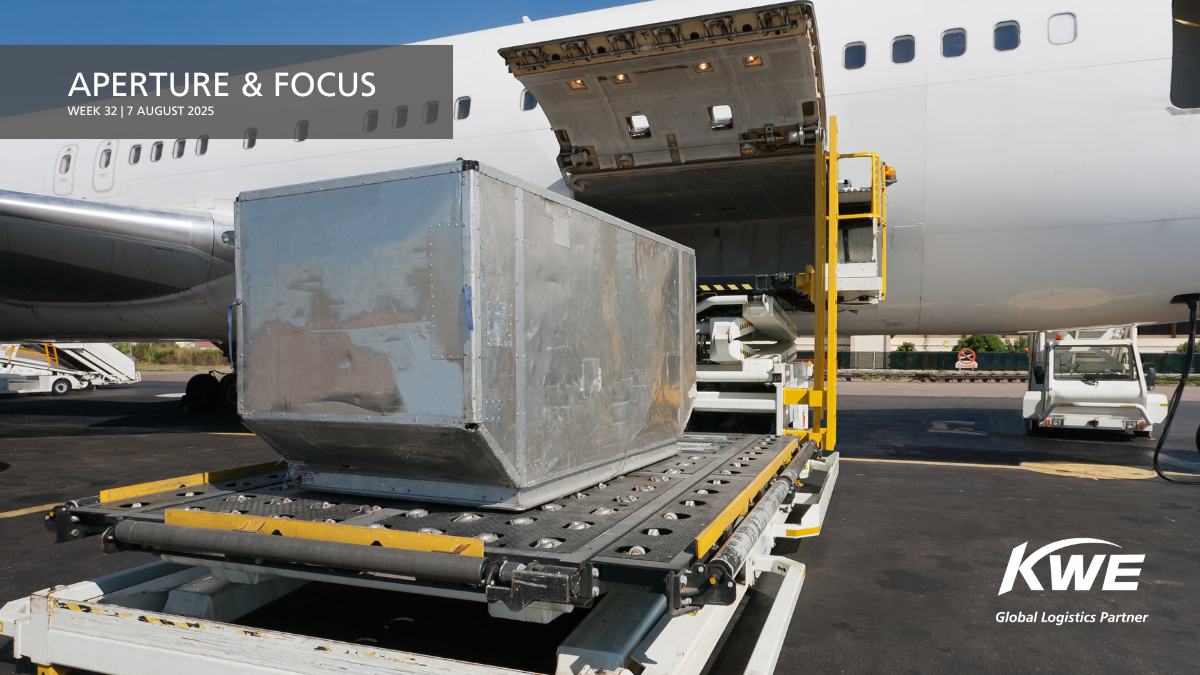Quote
Aperture & Focus 2025: Week 32

Global Aperture
Global air cargo demand rose by just 0.8% year-on-year in June 2025, as a strong 9.0% increase from Asia-Pacific carriers offset an 8.3% decline in North America and minimal growth in Europe. IATA highlighted that trade tensions, Middle East conflicts, and shifting U.S. tariffs contributed to the mixed regional results, underscoring the importance of stability, predictability, and digitalization in global trade.
Global container schedule reliability improved by 1.6 % month-over-month in June 2025, reaching 67.4%— its highest level since November 2023. Among shipping alliances, reliability varied significantly, with the top alliance exceeding 90% across all arrivals, while others ranged between approximately 55% and 75%.
Regional Focus
Americas
United States: The Port of Savannah recorded its second-busiest fiscal year in 2025, moving 5.7 million containers—a rise of 8.6% year-over-year—driven by retailers front-loading imports ahead of anticipated tariffs. However, volatility in trade policy led to a 9.6% drop in June volumes, with port officials warning of further softness through August unless tariff uncertainty stabilizes.
Beginning August 29, 2025, the de minimis exemption will end for commercial goods valued at $800 or less when shipped outside the international postal network. These shipments will now be subject to all applicable duties, following an Executive Order.
U.S. Customs and Border Protection (CBP) will begin nationwide rejection of shipments with missing or invalid Shipper or Consignee information in the Air Cargo Advance Screening (ACAS) program. A warning period began July 28, 2025, with rejections set to take effect September 27, 2025.
For more information on these and other compliance updates, refer to our latest Customer Advisories brought to you by KWE-USA Corporate Compliance.
Asia-Pacific
India: India has eliminated the requirement for mandatory air cargo re-screening at transfer airports to streamline logistics operations and attract more transshipment traffic. Under the new rules issued by the Bureau of Civil Aviation Security (BCAS), cargo must either be stored in secure Transfer Cargo Security Hold Areas (TCSHAs) or be transferred directly to the next aircraft within two hours. While industry leaders welcome the move as a step toward positioning India as a global air cargo hub, concerns remain about the readiness of airport infrastructure, the adequacy of workforce training, and the short timeline for the transition.
Bangladesh: The Chittagong Port Authority (CPA) has moved to cut vessel calls by nearly 13% amid severe congestion, with wait times now stretching 4–11 days. The Bangladesh Shipping Agents Association (BSAA) has pushed back, warning that restricting 15 vessels would disrupt garment exports and foreign trade, instead urging operational fixes like yard expansion and faster cargo clearance.
Europe, Middle East & Africa
Air freight traffic across Europe remained stable in H1 2025, with volumes up 0.1% year-on-year and 8.7% above pre-COVID levels, reflecting steady demand despite global uncertainties. Growth at key hubs like Madrid-Barajas, Cologne Bonn, and Heathrow highlights the continued strength of strategic cargo corridors, even as overall aircraft movements remain below 2019 levels.
This summer, major European ports including Antwerp-Bruges, Rotterdam, Hamburg, and Le Havre are facing severe congestion throughout August and September as a surge of Asian imports arrives amid already strained terminal operations. Efforts to redirect cargo to smaller ports or shift to inland modes like barge and rail have created additional bottlenecks, while low water levels on the Rhine and Danube have further strained shipping capacity.